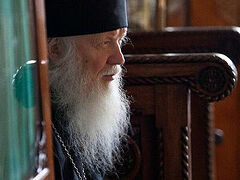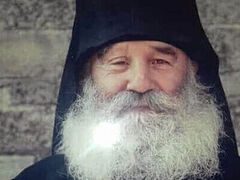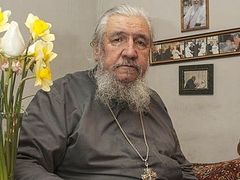The author continues his talk with Archimandrite Ambrose (Yurasov), the father-confessor of the Convent of the Entry of the Most Holy Theotokos into the Temple in the city of Ivanovo (Russia), and a famous pastor and preacher, at its dependency in Moscow, who reposed last May, 2020 due to complications from COVID-19.
Fr. Ambrose, who was raised monastically in the Holy Trinity-St. Sergius Lavra, talks more about the holy elders of the Lavra, and about Protestants, the Mystery of the Eucharist, and confession.
 The Holy Trinity-St. Sergius Lavra, 1978-1981
The Holy Trinity-St. Sergius Lavra, 1978-1981
— Was Fr. Kirill (Pavlov) already a spiritual father at that time?
—Yes, he always was a spiritual father. He was so thin, even skinny. Once during a fast he gave the following in a sermon in church: “We, brothers and sisters, overeat, we eat and drink too much and become fat.” Meanwhile he could hardly stand on his feet—he was nothing but skin and bones. Although, Fr. Theodorit’s sermons were better than Fr. Kirill’s… All the Lavra priests were spiritual.
—Were Fr. Naum’s spiritual children special?
—Sure. I noticed a very interesting thing: all the hieromonks in the Lavra had spiritual children back then.
I stayed at the Holy Trinity-St. Sergius Lavra for ten years, in the Pochaev Lavra for five years, and now by the grace of God I have lived as a monk for almost fifty years. It has turned out that during this time one can acquire such a state that he will have no spite, no anger, no resentment, no irritation, no indignation, no noise. And he will be calm, balanced and quiet; in his soul he will have joy, peace and stillness. This can be acquired. Such monks as Fr. Kirill and Fr. Naum attained this state.
—But what about illness, sorrow, oppression from people, and annoyance?
—They took it for granted, for the sake of greater holiness. And they reacted to it all like this: “We deserve this for our sins! We will bear it.” Why do we have diseases? Because we sin over and again in our lives, and when we come to realize that it is bad we repent and no longer sin. But for sins one must be punished, either by temporary suffering on earth or by everlasting suffering in eternity. It is better to suffer temporarily and thank the Lord for this, saying, “Glory to God for everything! This is not enough—I deserve a worse punishment for my sins!” We need to learn to always thank God. It is good for our souls. The Lord is our Father and He loves us. And the Lavra of St. Sergius is a seedbed of elders. Those novices who came to the monastery and were in contact with the fathers acquired this spirit and became like them.
—Formerly, as far as I remember, there was peace and quiet at the Lavra. Were there tourist groups at the Lavra in your time? Did foreigners visit it?
—Tourists appeared later. When the ecumenical movement became active, many foreigners appeared in the monastery, and guided tours began. Since I heard people’s confessions regularly, through those excursions people began to convert to God. When they came to the Lavra as tourists, they were amazed by the cathedrals, their beauty, by a completely different way of life, and by the large number of young people—students who could be met in the garden of the Theological Academy. That multitude of people had gathered here for a reason—something had brought them! It was no coincidence! So tourists would enter the lower church below the Dormition Cathedral where confession was being conducted. They would approach the priests and say, “I believe in God too! And I want to confess my sins!” Then foreigners of different denominations travelled to the Lavra to distribute Gospels free of charge. They would tell people that God exists—after all, this was no coincidence. Some didn’t accept the Gospel, but some did! And it was the case all over Russia.
I had such a providential story. When I went to church in my native Siberia, I was suddenly followed by someone (non-Orthodox) who was well-read in the Scriptures. I hadn’t read the Gospel before (there were no Gospels there)—I just had strong faith. I talked with him for an hour or two, but he didn’t succeed in winning me over—I remained Orthodox! He said to me at parting: “You and I will meet on the Day of the Last Judgment!” I replied, “Okay, we’ll meet then!”
At the Theological Academy I defended my thesis entitled, “The History of the Baptist Faith. An Analysis of its Doctrine.” The assistant professor said that such a work had been written for the first time in 200 years and advised all the students to read it. It was published.
One day on arriving in Moscow from Pochaev Lavra I dialed my acquaintances’ phone number and suddenly heard a click and some people talking about God: “Here’s the book by Hieromonk Ambrose (Yurasov).” And the speaker began to criticize me. It was clear that those people were Baptists! Unable to restrain myself, I interrupted them and said, “Guys, you misinterpret these things! It should be this way and not that way!” They asked, “Who are you?” I replied, “Hieromonk Ambrose (Yurasov).” They wondered, “How did you get here?” I said, “By Divine Providence!”
Once I arrived in Sukhumi and saw a Baptist prayer house near where I usually stayed. So I came to them for a Sunday meeting. They invited me to speak from the pulpit.
I ascended into the pulpit and made the sign of the cross: “In the Name of the Father, and of the Son, and of the Holy Spirit. I wrote a work on your doctrine, so I know your history as well as you do, perhaps even better. I would like to ask you a question. Who saves us: Christ or the Church?” They replied, “Christ!” I asked, “What about the Church?” They said, “The Church doesn’t save us.” I argued, “But the Apostle Paul says that the Church is the Body of Christ. And the Head of the Body is Christ. If the Church doesn’t save us and Christ alone does, then we take the Head and tear it off. So we want to be saved only with the Head. How’s that?” They said, “We don’t understand anything you said.” I repeated my words and added: “If we don’t honor the Mother of God, the angels and the saints, we don’t honor the Body of Christ! And this is the Church! But the Church, both heavenly and earthly, is one Church—the Body of Christ. Christ is the Head of this Body.”
They started asking me questions, and then they finished. The next Sunday I came again, but they didn’t give me the floor, saying, “What you say is out of tune with our beliefs.” I argued, “Why so? After all, there is one Christ! Listen, Protestantism is religious atheism! If we don’t accept the Body of Christ, it means we don’t accept Christ, the Mother of God and the saints.” They videotaped my speech. When I recently came to them again, they didn’t invite me and didn’t want to see me anymore. So it was no coincidence that a Baptist had pestered me with questions in Siberia many years before.
After defending my thesis I was invited to give a talk in Kazakhstan: I came to a huge cathedral (it was a Protestant prayer house) where there were Germans who knew the Bible by heart. I thought, “How will I talk to them? They know everything!” Surprisingly, there were thousands of people inside! And this was under the Soviet regime.
I prepared a talk on chapter 6 of the Gospel of John: on the Bread from Heaven. At the Last Supper Christ said: I am that Bread of life… This is the Bread which cometh down from Heaven, that a man may eat thereof, and not die. I am the living Bread which came down from Heaven: if any man eat of this Bread, he shall live for ever: and the Bread that I will give is My Flesh, which I will give for the life of the world… Except ye eat the Flesh of the Son of man, and drink His Blood, ye have no life in you. Whoso eateth My Flesh, and drinketh My Blood, hath eternal life; and I will raise him up at the last day… He that eateth My Flesh, and drinketh My Blood, dwelleth in Me, and I in him (Jn. 6:48-56). On hearing these words even some of His disciples left the Lord and no longer walked with Him. If at the wedding in Cana of Galilee Christ changed water into wine, then why can’t wine be transformed into Blood?
First the Protestants listened to me and then started to wriggle out my questions: “You misunderstand this. The words of the ‘Body of Christ’ implied His teaching.”
I answered, “During the conversation with the Samaritan woman the Lord spoke about the Holy Spirit allegorically. But here He spoke straightforward—literally about His Body and Blood.”
Though they attempted to change the subject, I told them, “Every month you ‘break bread’. When you take bread, isn’t it the Body of Christ?” They said, “No.” I proceeded, “When you use wine, isn’t it the Blood of Christ?” They said, “No.” I asked, “I saw that you give the leftover breadcrumbs to birds and distribute the leftover wine among people. Isn’t it Blood?” They repeated, “No, not Blood. When we take Communion, we remember the Passion of Christ, Whose Blood was spilled.” I concluded, “So it means that you don’t partake of the Body of Christ!”
—What do you think contemporary Orthodox Christians should pay special attention to nowadays?
—I recently met a woman who said to me, “Yes, I believe in God, read the Gospel and sometimes go to church. But I don’t understand why people receive Communion from the same spoon! It’s unhygienic, and there are various germs.” I answered her, “You just don’t understand the most important thing. The Church has celebrated the Divine Liturgy for 2000 years. As communicants approach the chalice, the choir sings: ‘Receive ye the Body of Christ. Taste ye of the fountain of immortality.’” So we partake of and receive the Living Christ. Not some part of His Body, but the whole Christ enters us! This is why the Church is strong. Over three centuries, millions of Christians were martyred, but since they all received Christ in their lives they are all alive! For 2000 years Christians have been persecuted, especially during the seventy years of the Communist regime (in Russia)! But those people received Christ, and to this day the Church lives by this.
Many of those who go to church don’t know why they do this. And I’ll tell you: Every Liturgy briefly relates the life of Christ on earth. For example, when the priest comes to the solea with the Gospel, it symbolizes Christ Who went out to preach publicly. When the priest comes out with the chalice as the choir sings the Cherubic Hymn, it symbolizes Christ voluntarily going to suffer on the Cross. When the cross is brought out from the altar, it symbolizes the cross as an instrument of torture.
When the Eucharistic Canon begins, the deacon exclaims, “Let us stand aright; let us stand in fear; let us attend, that we may present the Holy Offering in peace.” This is the Crucifixion of Christ. When the priest raises his arms three times while “We hymn Thee, we bless Thee…” hymn is sung, the Holy Spirit descends on the Holy Gifts: the transformation of bread and wine into the True Body and the True Blood of Christ takes place. The priest bows down to the ground—he bows to the Living Christ. The Body of Christ is divided into small particles, then they are put into the Blood, into the chalice, and the priest himself partakes of the Gifts, uniting with Christ.
When he goes out to the faithful, we hear the exclamation: “With the fear of God, faith and love, draw nigh.” Those people who have prepared, repented and purified themselves worthily receive the Living Christ. An acolyte from Belarus recently called me and asked, “When the choir was singing, ‘We hymn Thee,’ I went into the altar with a censer, and the priest blessed the Bread and the chalice. Then I suddenly saw the Theotokos in a great light, robed in blue and standing to the right of the altar table, and the entire altar seemed to be illuminated by an unearthly light! What was it?” I said to him, “The Lord has revealed this to you so people may know that the Liturgy is not just a ‘rite’—it is a great Divine service, and the Church is a piece of Heaven on earth. By crossing the threshold of a church we enter Heaven. The Lord Himself, the Mother of God and the entire Heavenly Church, together with the angels and all the saints, are present in the altar. This is a small piece of Heaven on earth.”
 Archimandrite Ambrose (Yurasov) That is why people go to church and take Communion with their children. I think this must come first today!
Archimandrite Ambrose (Yurasov) That is why people go to church and take Communion with their children. I think this must come first today!
It is necessary for people to repent of their sins, but not just formally, saying, “Father, I’ve fornicated, I’ve had abortions...” No, this is not repentance! Let’s open the Book of Needs for clergy, and it says how we should conduct confession. How many abortions a person had, how many men (or women) a person sinned with... All these details must be said during confession! But hardly anybody does this! They watch indecent movies easily, but it’s “difficult” for them to go to confession!
A woman doctor recently came to confession. She had never repented before. I told her, “Imagine that you are sixty and you have never washed yourself! Is this good? The Lord gave each one of us a soul to make it pure and holy, and you have never purified it! Get ready and come to confession tomorrow!” She came and I asked her, “How is it that you have never been to confession?” She replied, “Father, I felt ashamed and awkward…” I said, “On the Day of the Last Judgment all our unrepented sins will be revealed for the whole world and the angels to see! I have heard confessions for forty-eight years and I already know everything! When a person repents sincerely, the priest rejoices. Your soul rejoices, and mine too. So it is necessary to cleanse the soul of all the sins that torment it. You will understand how good it is. You must tell the priest everything without deliberately concealing anything!”
I help people confess. They approach and answer my questions, “Have you committed this sin?” They answer, “No, I haven’t.” But after a while the same person returns: “My conscience keeps tormenting me: I said no, but in fact I have committed this sin. I want to relieve myself from this burden.” Our conscience is the voice of God: it will torment us, and you can’t get away from it.
When a human soul leaves the body, demons surround it if the person didn’t repent during his lifetime—and they show him all his sins. Because our deeds and thoughts don’t disappear—everything is imprinted in eternity forever. We will cry bloody tears and tear our hair out—but there will be no chance for repentance. We must come to God already in our lifetime because the Lord has prepared a new earth and a new heaven for us. Nothing impure will enter the Kingdom of God (cf. Rev. 21:27). And most importantly, as the Apostle Paul said, Though I speak with the tongues of men and of angels, and have not charity, I am become as sounding brass, or a tinkling cymbal. And though I have the gift of prophecy, and understand all mysteries, and all knowledge; and though I have all faith, so that I could remove mountains, and have not charity, I am nothing. And though I bestow all my goods to feed the poor, and though I give my body to be burned, and have not charity, it profiteth me nothing (1 Cor. 13: 1–3). We can’t live without love. Why? Because God is Love. And we have no love among ourselves. Why do we swear at and get angry with our neighbor? Because we don’t love him! And this is a problem. We need to pay special attention to this!





